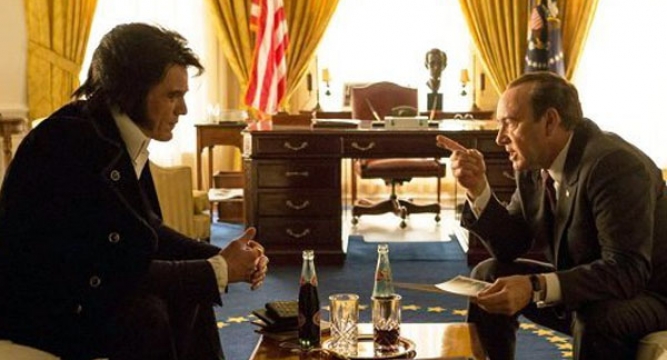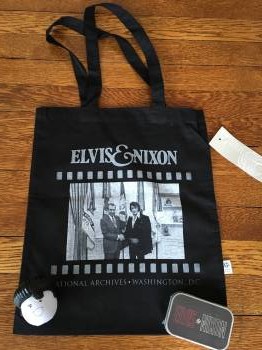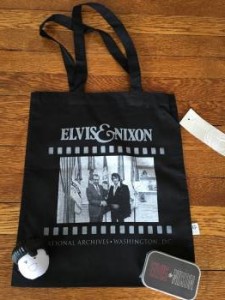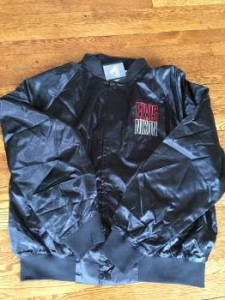Interview: Director Liza Johnson of “Elvis & Nixon”
Posted on April 25, 2016 at 3:25 pm

The image of Presley and Nixon standing awkwardly together in the Oval Office is the most requested photograph in the history of the US National Archives. “That dissonance is probably why people are interested in the photograph,” Johnson said. “They’re both very well known to us and they mean something to us. I think Elvis means something more countercultural and Nixon mean something establishment. That’s why it’s weird to see them in the picture together. In a way I think that’s the spin of the movie too.” She said that despite her great respect for Shannon, he would not have come to her mind to play Presley. “I don’t know who I would have thought of but it would not have been him because he doesn’t immediately have any likeness to Elvis or have personality traits that make me think of Elvis or have a repertoire of characters in the past the remind me of Elvis. When I read it, I got it. It has so much intimate depth for the Elvis character and that’s what Mike can do. He has a sort of very sophisticated relationship to drama, comedy. You know Ionesco is his favourite playwright and I knew that honestly once I read it I couldn’t think of anyone who could do a better job of navigating among those properties which were written in the story. We were both were interested in the ways that the script is a bit counter to the most kind of dominant understandings of the characters. People think of Elvis as a glittering brilliant beautiful surface but no one ever thinks about what Elvis might wonder about or what was going on in Elvis’ inner life. With Nixon the opposite is almost true. The most common thing ever said about him is that he is complicated. When people talk about him they talk about his psychological issues and it’s never about his beautiful surfaces or anything. This story suggested two things that we don’t think of. One is that Elvis had an inner life and two is that Nixon, this complicated man who is constantly doing morally compromising things like blowing up Cambodia or actually infiltrating the countercultural movements that Elvis is talking about going undercover in. He had not yet done Wategate at this point but he was doing all these other things so if I were him, I’d be sweating. Yet in this story we can also have a sliver where the main thing he’s doing is not understanding whether he should meet with a rock star. I actually found that charming. Partly because it’s so different from where that entertainment and political culture is at now.”
Instead of Elvis Presley songs, the soundtrack features other music from the era, including Elvis playing and singing along to “Suzy Q.” “You know, Elvis did do stuff like that. In this period he was covering popular music including the Beatles, at least three songs. I didn’t know that; it’s something I found by looking. He did sing some CCR songs and Neil Diamond in this period and I guess he was really kind of a promiscuous lover of all kinds of music including opera. In most of the source music that I put in the movie I really wanted to focus on the regional, southern, like 1970’s soul into funk period. I think that it reflects something about the place and time.”
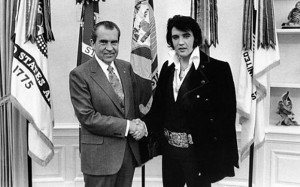
She found Shilling’s insights especially helpful. “The thing that I learnt the most from on this project was actually Jerry Schilling’s book, Me and Guy Named Elvis, which is a really beautiful and intimate account of their friendship. It’s a very self-reflective. He is either a genius or he’s been to a lot of therapy. He has a real capacity to reflect on himself which is very unusual. That book is like a real anatomy of what it’s like to be the friend of a superstar and I really recommend it. It was like a very guiding document for me and also I got to work with him. I got to be friends with him, and I think his story is not the typical one of someone who hangs out with a superstar. Jerry stayed friends with Elvis for his entire life precisely because he took some measure of distance at some crucial moments. The other guys didn’t necessarily do that and that didn’t end well. I feel like there is a profound lesson about friendship in there about what is beneficial about closeness and what is beneficial about distance.”

